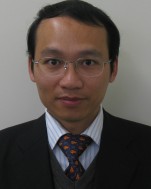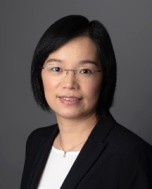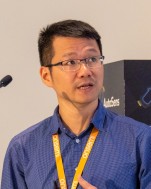Keynote Speaker
- Dr. Dzung Dao, Professor at Griffith University, Australia - "Title: Advanced MEMS Sensors: from Research to Applications".
- Dr. Ya-Jun Pan, Professor at Dalhousie University - "Title: Advanced Robust Control Strategies for Cooperative Multi-Robot Systems".
- Dr. Anton Netchaev, Research Scientist at Engineer Research and Development Center, USA - "Title: Robotics and Autonomy Research for US Waterways Infrastructure".
- Dr. Son Tong, Senior Research Engineer and Project Manager at Siemens Digital Industries Software, Belgium - "Title: On the Intersection of ADAS Simulation, Vehicle Testing, and Algorithms Development".
- Dr. Yorie Nakahira, Assistant Professor at Carnegie Mellon University, USA - "Title: Safety of intelligent control systems".
- Advanced MEMS Sensors: from Research to Applications
- Abstract:
- Biography:
- Advanced Robust Control Strategies for Cooperative Multi-Robot Systems
- Abstract:
- Biography:
- Robotics and Autonomy Research for US Waterways Infrastructure
- Abstract:
- Biography:
- On the Intersection of ADAS Simulation, Vehicle Testing, and Algorithms Development.
- Abstract:
- Biography:
- Safety of intelligent control systems
- Abstract:
- Biography:
Speaker: Dr. Dzung Dao, Professor at Griffith University, Australia

This talk introduces our cutting-edge sensor technology based on Silicon (Si) and Silicon Carbide (SiC) Micro Electro-Mechanical Systems (MEMS) and demonstration of their applications in the fields of robotics and smart cities. The presentation will begin with introducing advanced sensing effects in semiconductors, the development of high-performance micro/nano sensors, and finally, demonstrations of some applications. MEMS relate to the research and development of integrated micro/nano electro-mechanical sensors and actuators based on microelectronic technology to achieve high precision and throughput. MEMS sensors offer distinct advantages over traditional sensors, including compact size, lightweight, low power consumption, high accuracy, and cost-effectiveness thanks to its mass production capabilities. Recently, silicon MEMS sensors are gaining significant attention due to its compatibility with semiconductor and IC chip technology, which is emerging as a national priority in many countries, including Vietnam. Our discovery of innovative sensing concepts and the development of high-performance sensors will advance the robotics industry and Internet of Things (IoT)-based smart cities applications.
Professor Dzung Dao received his BEng degree, MEng degree from Hanoi University of Science and Technology (Vietnam) and a PhD degree from Ritsumeikan University (Japan) in 1995, 1997 and 2003, respectively. He is currently a Director of Mechatronic Engineering at Griffith University, Australia. He used to serve as Head of Mechanical Engineering Department at Griffith (2017 to 2023), and Chair of National Committee on Mechatronics, Engineers Australia (2019-2021). He has over 20 years of high-impact research experience in semiconductor physics, micro and nanofabrication, sensors and actuators, and has established himself as a leading researcher in this field with over 400 publications, 8 books/book chapters, and 18 patents. Furthermore, he has secured research grants exceeding AU$11.5M from esteemed organizations, such as Australian Research Council (ARC), Corporate Research Centre (CRC), Department of Foreign Affairs and Trade (DFAT), among others. Professor Dao is ranked among the world’s top 2% most-cited scientists in Applied Physics (Stanford University rankings 2022) and being the top 1 researcher worldwide for publications and citations in the SciVal Topic Cluster of Pressure Sensors, Sensors.
Speaker: Dr. Ya-Jun Pan, Professor at Dalhousie University, Canada.

A team of robots is usually more efficient and with more operational capability when used to achieve a common task than a single robot, especially for tasks which are difficult for an individual robot to complete, such as co-manipulations in Industrial 4.0, surveillance, and surveying etc. In recent years, the cooperative control of multi-agent systems has been an active area of research with formulations such as collaborative robots, swarming, flocking, foraging, consensus, and rendezvous, etc. In this presentation, the background and challenges of the multi-robot systems will be firstly introduced. Two recent strategies on the application of robust controllers on the cooperative multi-robot systems will be presented. The first work introduces a novel decentralized control framework that integrates admittance control, nonsingular terminal sliding mode control, and load distribution to cooperatively manipulate a single object with multiple robotic manipulators. Admittance control grants the system a level of compliance for safe human-robot physical interaction. The admittance controller maintains all communication between the manipulators. The controller provides accurate tracking of the manipulators in the presence of disturbances and dynamic model uncertainties. A decentralized load distribution method is designed to minimize the internal forces on the object. The second work presents a novel approach to the time varying formation for the purpose of collision and obstacle avoidance using a displacement-based formation algorithm. A fast terminal sliding mode controller is used for the motion control of the agents. From arbitrary positions these agents move to a formation, and then navigate an unknown environment with multiple goal points. These agents use sensor data, such as measurements from ultrasonic sensors or lidar, to observe their environment and adjust the size of their formation in order to properly travel through the environment, as well as use an artificial potential field process for local collision and obstacle avoidance. Extensive simulation and experimental results will be demonstrated for the research on multi-robot systems in the Advanced Control and Mechatronics Lab at Dalhousie University.
Ya-Jun Pan is a Professor in the Department of Mechanical Engineering at Dalhousie University, Canada. Her main research interests are robust nonlinear control, cyber physical systems, intelligent mechatronics, and robotics with more than 190 authored journal and conference papers published. She has been recognized as a Fellow of Canadian Academy of Engineering (FCAE’2023), Engineering Institute of Canada (FEIC’2021), American Society of Mechanical Engineers (FASME’2017), Canadian Society of Mechanical Engineering (FCSME’2023) and received the research excellence award (2008) at Dalhousie University and Alexander von Humboldt Research Fellowship (2016) from Germany. She is a Senior Editor for IEEE/ASME Transactions on Mechatronics, an Associate Editor for IEEE Transactions on Industrial Informatics and Industrial Electronics Magazine, and a member of IEEE Control Systems Society Conference Editorial Board from 2023. She has served as Associate Editors for IEEE Transactions on Industrial Electronics (2019-2021), IEEE Transactions on Cybernetics (2016-2023), and IEEE/ASME Transactions on Mechatronics (2015-2020), Vice President-Atlantic Region of CSME (2018-2020), Canada, and Program Co-Chairs for several international conferences. Currently she serves as the IEEE IES AdCom Member-at-Large, Chairs of IEEE IES Women in Engineering and IEEE IES Distinguished Lecturer Program. Dr. Pan is a Senior Member of IEEE, and a registered Professional Engineer in Nova Scotia, Canada.
Speaker: Dr. Anton Netchaev, Research Scientist at Engineer Research & Development Center (ERDC) in Vicksburg, Mississippi, USA.

We maintains and operates a wide variety of large civil work infrastructure in the United States including over 700 locks and dams and tens of thousands of kilometers of levees. Much of this infrastructure has exceeded its design life and requires continuous assessment, maintenance, and repair. Conventional repair and rehabilitation of waterways infrastructure requires costly shutdowns, is labor intensive, and exposes personnel to hazardous conditions. The Engineer Research and Development Center (ERDC) is responsible for research and development of new technologies and capabilities that will allow for repairs and rehabilitations to be conducted rapidly, minimize project outages, reduce labor burden, and increase safety for personnel. Autonomous robotic systems have the promise to automate inspection and repair of critical infrastructure, but present challenges due to the unstructured complex operational conditions. This presentation will discuss current challenges and existing robotic and autonomous technologies developed by ERDC.
Dr. Anton Netchaev is a Senior Research Scientist at Engineer Research & Development Center (ERDC) in Vicksburg, Mississippi. He specializes in the fields of autonomous ground robotics, intelligent sensing, and microelectronics, with an extensive background in electrical and computer engineering. Dr. Anton Netchaev has received his doctorate degree in Computational Science in 2015 from the University of Southern Mississippi. He also holds a master’s degree in electrical engineering and a Bachelor’s degree in Computer Engineering. Dr. Netchaev currently also serves as an Adjunct Professor at Mississippi State University and Associate Graduate Faculty at Wright State University.
Speaker: Dr. Son Tong, Senior Research Engineer and Project Manager at Siemens Digital Industries Software, Belgium.

The rise of autonomous vehicles and ADAS (Advanced Driver Assistance Systems) is driving cutting-edge technologies in multiple areas, for example, AI, control, simulation, testing, and safety. The ADAS system is complex with multi-modal sensors and algorithms (perception, planning, and control). Another major challenge is the diversity of the traffic environment, particularly in edge scenarios. The strict safety and comfort requirements are also pushing the design and testing technologies. This talk discusses some R&D activities on how Siemens is leveraging Digital Twin tools to support the ADAS engineering developments. The focuses are on three pillars: Sim2Real - from simulation to physical vehicle testing (XiL development cycle), Real2Sim - from real data to simulation-based testing, and safety-comfort algorithms (control, AI). Some autonomous driving use cases will be demonstrated.
Dr. Son Tong is an ADAS R&D Manager at Siemens Digital Industries Software, working on automated driving, control systems, and AI engineering topics. Son Tong is active in research and commercial autonomous system programs. He is technical coordinator for Siemens at multiple EU programmes such as Enable-S3 (ADAS V&V), FOCETA (Trustworthy AI), and Marie Curie ELO-X (Embedded learning and optimization). The technologies often involve state of art algorithms, simulation and physical testing methods. He was awarded Siemens PL Invention of the Year Award, and selected in the AutoSens most influential research award finalist. He is also supervisor of industrial PhDs, and a judge in Formula Student Germany Driverless racing category.
Speaker: Dr. Yorie Nakahira, Assistant Professor at Carnegie Mellon University, USA.

Autonomous systems utilizing learning-based techniques must safely operate in uncertain and interactive environments. In this talk, we will overview our recent projects focusing on the safety of such systems. One critical aspect of safe decision-making is to account for strategic human behaviors. While safe control frameworks are often designed to behave safely even in worst-case human uncertainties, this can encourage humans to behave more aggressively and result in greater risk for everyone. Here, we will present a framework to formally investigate situations in which conservative safe control methods compromise safety. Our analysis suggests a need to rethink the safe control method in highly interactive situations. Another critical aspect is to deal with latent risks and extreme situations, e.g., driving on a slippery and occluded mountain road. Here, we will introduce a probabilistic safety certificate that can certify a data-driven controller while accounting for latent risks and uncertainty in changing system dynamics. This certificate integrates reachability- and invariance-based approaches via a new notion of forward invariance to exploit the advantages of both approaches. The proposed method has three features. First, it systematically mediates behaviors based on the levels of latent risks and interaction models. Second, it guarantees long-term safety using a computationally efficient (myopic) controller. Third, it allows multiple agents to collaboratively ensure system-wide safety specifications even if each agent does not have sufficient information to evaluate the specifications. Finally, many safe control and learning techniques, including the ones introduced above, require an accurate estimation of long-term risk probabilities and their gradients. However, the evaluation of long-term risks and rare events requires heavy computation. Here, we will show that a physics-informed neural network can be used to estimate long-term risk probabilities with provable guarantees. The neural network can be trained using samples from short-term trajectories and partial states to accurately estimate longer-term risk probabilities of unseen states, and do so with provable accuracy under mild assumptions.
Yorie Nakahira is an Assistant Professor in the Department of Electrical and Computer Engineering at Carnegie Mellon University. She received B.E. in Control and Systems Engineering from Tokyo Institute of Technology and Ph.D. in Control and Dynamical Systems from California Institute of Technology. Her research interests include the fundamental theory of optimization, control, and learning and its application to autonomous robots, neuroscience, cell biology, smart grid, cloud computing, microfinance.

